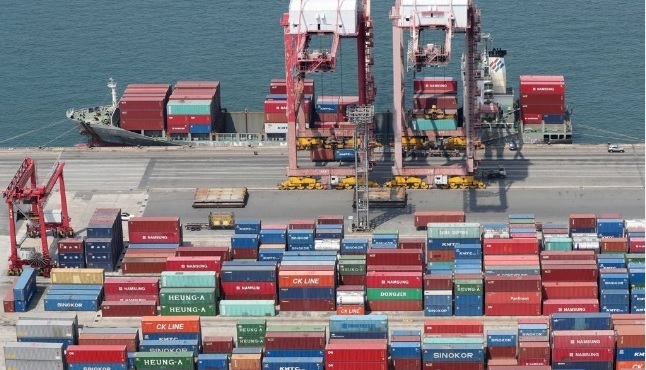Japan sees exports to Korea fall, but Korean firms unaffected
By Kim Da-solPublished : Dec. 15, 2019 - 13:57
Six months after Japan’s restrictions on exports to South Korea, its exports to Korea fell by 14 percent on-year, while South Korean export to Japan dropped by 7 percent, indicating Japan’s larger damage in outbound shipments, data showed Sunday.
According to the governments and industries in two countries, from July to October, Japan’s export shipments to Korea came at around $15 billion, which fell by 14 percent on-year.
Over the same period, South Korean export shipments to Japan recorded $9.4 billion, which was a drop by 7 percent on-year.
Based on the reduced trade volume, South Korea moved one slot lower to become the fourth-largest country of export for Japan in October, while it had ranked third since 2005.
According to the governments and industries in two countries, from July to October, Japan’s export shipments to Korea came at around $15 billion, which fell by 14 percent on-year.
Over the same period, South Korean export shipments to Japan recorded $9.4 billion, which was a drop by 7 percent on-year.
Based on the reduced trade volume, South Korea moved one slot lower to become the fourth-largest country of export for Japan in October, while it had ranked third since 2005.

On July 4, Japanese government curbed exports of three chemicals to South Korea -- fluorinated polyimide, photoresist and hydrogen fluoride -- that are used to manufacture semiconductors and display panels, crucial for the nation’s dominant tech industry.
Since then, Japan’s first approval on export of photoresist was made on Aug. 7. Japan approved a shipment of fluorinated polyimides in late September, and approved export of liquid hydrogen fluoride in mid-November.
Despite delayed export approvals on certain items exported to Korea, industry insiders said Korean companies were influenced at a minimum level, partly due to efforts to find alternative sources including by developing domestic manufacturing technology.
“So far, we have not received a report or a case of a local company experiencing problems in their production due to Japan’s export curbs,” an official from the Trade Ministry said.
According to LG Display, it began sourcing all its hydrogen fluoride -- used for display panel production -- from a local firm from October.
Samsung Display said it had recently completed testing on locally produced hydrogen fluoride and will start using it once the current stocks run out.
To encourage local suppliers to meet increased domestic demand and develop their competitiveness in the long term, the South Korean government has also mapped out measures to support firms in related industries.
According to the Trade Ministry, its budget to support industries dealing with materials, component and equipment production has increased almost double from 669 billion won ($569 million) of this year to 1.27 trillion won in the next year. It has also set aside a budget for new businesses such as independent technology development for strategic materials.
Meanwhile, South Korea and Japan agreed to hold talks over export controls in Tokyo on Monday, the first of their kind since 2016.
But Japan’s Industry Minister Hiroshi Kajiyama said during a press conference on Dec. 6 that there was no possibility that the talks will find a solution regarding the ongoing trade spat.
Instead he said, “I hope that through dialogue, we can step up cooperation on nonproliferation of weapons of mass destruction,” according to Nikkei Asian Review.
A South Korean government official also told a local news outlet that it is still “difficult to predict what outcome will this talks bring.”
By Kim Da-sol (ddd@heraldcorp.com)






![[From the Scene] Monks, Buddhists hail return of remains of Buddhas](http://res.heraldm.com/phpwas/restmb_idxmake.php?idx=644&simg=/content/image/2024/04/19/20240419050617_0.jpg&u=20240419175937)








![[From the Scene] Monks, Buddhists hail return of remains of Buddhas](http://res.heraldm.com/phpwas/restmb_idxmake.php?idx=652&simg=/content/image/2024/04/19/20240419050617_0.jpg&u=20240419175937)

![[KH Explains] Hyundai's full hybrid edge to pay off amid slow transition to pure EVs](http://res.heraldm.com/phpwas/restmb_idxmake.php?idx=652&simg=/content/image/2024/04/18/20240418050645_0.jpg&u=20240419100350)

![[Today’s K-pop] Illit drops debut single remix](http://res.heraldm.com/phpwas/restmb_idxmake.php?idx=642&simg=/content/image/2024/04/19/20240419050612_0.jpg&u=)